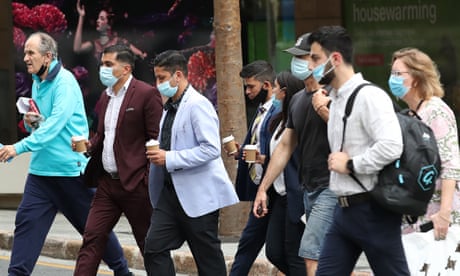- by foxnews
- 08 Apr 2025
?Almost unprecedented? spike in number of Australians who see racism as a problem, survey finds
‘Almost unprecedented’ spike in number of Australians who see racism as a problem, survey finds
- by theguardian
- 30 Nov 2021
- in news

Australians are increasingly aware that racism is a problem in their country, while positive sentiment about immigration and multiculturalism has also increased over the past 12 months, according to an authoritative survey on social cohesion.
The annual Mapping Social Cohesion Report from the Scanlon Foundation Research Institute, released on Tuesday, has charted a 20 percentage point increase in 12 months in response to the question "How big a problem is racism in Australia?"
Back in 2020, 40% of respondents thought racism in Australia was either a very big or fairly big problem. But in the 2021 survey of 3,572 respondents, 60% held that view.
The survey authors note "an increase of 20 percentage points in response to a general question of this nature is almost unprecedented in the Scanlon Foundation surveys", which have been conducted annually since 2007. But they say there is no clear trigger or cultural catalyst explaining such a large shift.
The research suggests Australians were also more enthusiastic during the period of pandemic-induced international border closure about the contribution migrants make to the economy, with 86% of the sample agreeing with the proposition "immigrants are generally good for Australia's economy" (compared with 76% in 2019, the year before Covid-19 hit).
Similarly, 86% of respondents agreed "multiculturalism has been good for Australia" compared with 80% agreeing with that proposition in 2019. A super-majority (90% - the highest affirmation in the survey) also endorsed the importance of the relationship between Aboriginal and Torres Strait Islanders and the wider Australian community.
But the latest report also notes that a deeply established "longstanding hierarchy of ethnic and racial preference" exists alongside majority community endorsement of Australia's cultural diversity.
This hierarchy is established by responses to questions about attitudes to immigrants from particular ethnic backgrounds. In general terms, Australians are more negative about immigrants from India, China, the Middle East and Africa than arrivals from Britain or European countries.
"Between July 2020 and July 2021 there has been a marginal reduction in the indication of negative views, yet the hierarchy still remains," the latest Scanlon report says. "Negative attitude towards immigrants from Lebanon were indicated by 42% in 2020 and 38% in 2021; towards Sudanese, 49% in 2020 and 46% in 2021."
Australians are also more negative about Muslims than other faith groups (37% of respondents were negative in 2020 and 32% in 2021).
The 2021 Scanlon Foundation national survey, led by emeritus professor Andrew Markus from Monash University, is the fifteenth in the series. The bulk of the fieldwork was undertaken in July.
As part of mapping social cohesion, the research canvassed community attitudes to government management of the pandemic.
In the 2020 data, 85% of respondents approved of the Morrison government's management of the pandemic. But in the latest survey, that's fallen to 52%. States able to suppress Covid infections without long lockdowns, like Western Australia and South Australia, had approvals of about 90%, while community support for the New South Wales government was 59%.
The data also shows the public were on board with public health restrictions, including lockdowns. "While there were protests against government lockdowns which gained much media attention, the survey finds that approval of lockdowns won close to 90% endorsement," the survey says.
"In July 2021, 87% of respondents across the nation viewed lockdown restrictions as definitely required or probably required; in the states most affected, restrictions were approved by 91% of New South Wales and 85% of Victorian respondents".
The survey also tracks trust in the federal government. Trust had been at a low ebb before coronavirus hit, bumping along in the 30% range. But in 2020 there was a rebound to 54%, which was "the highest proportion obtained in the fifteen years of surveying by the Scanlon Foundation".
But the trust rebound did not last. By July 2021, the relevant measure was down 10 percentage points to 44%, although the survey notes that reading is still above the long-term average.
In response to a question about personal trust - a metric regarded as a key indicator of a cohesive society - Australians trusted each other more than they did a year ago (in 2019, 43% agreed most people can be trusted and in 2021, that was up to 52%).
Survey respondents were largely optimistic about Australia's future despite the travails of the pandemic and a majority (71% compared with 64% the year before) expressed satisfaction with their financial situation.
The Morrison government transferred billions in taxpayer support for workers and businesses over the course of the pandemic. As Canberra rolled out income support, the household savings ratio notched up a record rise.
But focus groups also yielded significant insights about how any future health crisis could be better managed. There is a view communication need to be improved with community members from non-English speaking backgrounds.
There was also concern about inequities with technology, the burden placed on women attempting to manage home-based learning and remote employment, and about the impact of school closures on children. "Many interviewees expressed strong concern about disengagement amongst children and young people," the report says.
- by foxnews
- descember 09, 2016
Ancient settlement reveals remains of 1,800-year-old dog, baffling experts: 'Preserved quite well'
Archaeologists have recently unearthed the remarkably well-preserved remains of a dog from ancient Rome, shedding light on the widespread practice of ritual sacrifice in antiquity.
read more


